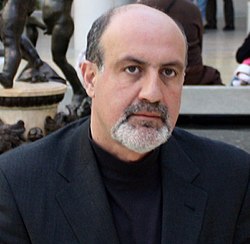Nassim Nicholas Taleb Quote
Popper’s falsificationism is intimately connected to the notion of an open society. An open society is one in which no permanent truth is held to exist; this would allow counter-ideas to emerge. Karl Popper shared ideas with his friend, the low-key economist von Hayek, who endorsed capitalism as a state in which prices can disseminate information that bureaucratic socialism would choke. Both notions of falsificationism and open society are, counterintuitively, connected to those of a rigorous method for handling randomness in my day job as a trader. Clearly, an open mind is a necessity when dealing with randomness. Popper believed that any idea of Utopia is necessarily closed owing to the fact that it chokes its own refutations.
Popper’s falsificationism is intimately connected to the notion of an open society. An open society is one in which no permanent truth is held to exist; this would allow counter-ideas to emerge. Karl Popper shared ideas with his friend, the low-key economist von Hayek, who endorsed capitalism as a state in which prices can disseminate information that bureaucratic socialism would choke. Both notions of falsificationism and open society are, counterintuitively, connected to those of a rigorous method for handling randomness in my day job as a trader. Clearly, an open mind is a necessity when dealing with randomness. Popper believed that any idea of Utopia is necessarily closed owing to the fact that it chokes its own refutations.
Related Quotes
About Nassim Nicholas Taleb
Taleb is the author of the Incerto, a five-volume work on the nature of uncertainty published between 2001 and 2018 (notably, The Black Swan and Antifragile). He has taught at several universities, serving as a Distinguished Professor of Risk Engineering at the New York University Tandon School of Engineering since September 2008. He has also been a practitioner of mathematical finance and is currently an adviser at Universa Investments. The Sunday Times described his 2007 book The Black Swan as one of the 12 most influential books since World War II.
Taleb criticized risk management methods used by the finance industry and warned about financial crises, subsequently profiting from the Black Monday (1987) and the 2008 financial crisis. He advocates what he calls a "black swan robust" society, meaning a society that can withstand difficult-to-predict events. He proposes what he has termed "antifragility" in systems; that is, an ability to benefit and grow from a certain class of random events, errors, and volatility, as well as "convex tinkering" as a method of scientific discovery, by which he means that decentralized experimentation outperforms directed research.
